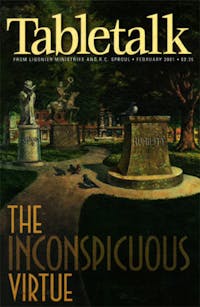
Request your free, three-month trial to Tabletalk magazine. You’ll receive the print issue monthly and gain immediate digital access to decades of archives. This trial is risk-free. No credit card required.
Try Tabletalk NowAlready receive Tabletalk magazine every month?
Verify your email address to gain unlimited access.
Thank you, Peter Beskendorf. You have reached across the centuries to influence me and many of my friends. For at least two decades, Peter Beskendorf served as Martin Luther’s barber in Wittenberg, Germany. Even more, he was Luther’s friend. “Master Peter,” as Beskendorf was known in Wittenberg, wielded a razor that was more than sharp enough to cut the throat of the man who sat in his chair with a price on his head. But Luther trusted his valued head to Peter and his ministrations.
Beskendorf once told Luther that he was planning to write a book that would serve as a warning against the power and cunning of Satan. Luther responded by writing 40 lines of humorous verse, beginning with:
No one will become that sharp
That he can know the devil well;
No, tarred he’ll be with his own brush,
And will not in peace be left
Unless Christ is there behind him.
I am grateful to Beskendorf because of a question he once asked his illustrious customer. Master Peter recognized the link between Luther’s prodigious prayer life and his obvious greatness, so he asked the Reformer to teach him how to pray. Luther responded by penning a small book titled A Simple Way to Pray, which he dedicated to his friend. He published it in 1535, and the book went through four editions the first year it was in print.
Luther’s response to Beskendorf’s request has touched me, and I believe it is valuable to all who struggle with prayer. The guilt Christians carry around because of undisciplined and feeble prayer lives is a burden that screams for relief. It seems that believers in every generation must face the moment when they cry out for help with prayer, just as the disciples did when they said to Jesus: “ ‘Teach us to pray.’ ”
As pastors, it is not enough for us to exhort our people to pray and admonish them when they neglect prayer. If the flock does not pray, it is likely that they simply do not know how to pray. And if they do not know how to pray, chances are that no one, including their pastor, has taught them how.
Recently, our little church went through a prayer seminar led by Archie Parrish of Serve International, based in Atlanta, Ga. The weekend experience was designed to train us in what Archie calls “kingdom-focused prayer.” It involved refocusing our prayers from purely personal concerns and mundane matters to the work of the church and the ministry of Christ. The program involves the creation of “fire teams” consisting of four members who covenant to pray daily for 15 minutes for three months. After the first three months, the time is elevated to 30 minutes a day for another three months, and so on until the prayer time reaches one hour per day. Imagine what happens in a church when scores of people are praying for the ministry for an hour a day.
One of the keys to achieving this focus is following the practical suggestions set forth by Luther in his A Simple Way to Pray. We memorize the Lord’s Prayer, the Apostles’ Creed, and the Ten Commandments. Then we pray through these elements. This does not mean that we simply pray the Lord’s Prayer or recite the Creed. Rather, we follow their content to guide and direct our prayers.
I cannot pray through the Lord’s Prayer in 15 minutes. It is easy to fill 15 minutes simply on the petition “Hallowed by Thy name.”
It is helpful to pray aloud and even to walk around while praying through these matters. Luther routinely prayed for four hours a day.
The Psalms can be added to the list to help us pray. Our group has memorized Psalms 1, 8, and 51 to help us in articulating adoration and confession in our prayers.
Needless to say, I am excited about flooding the church and the world with Christian prayer warriors. God uses prayer as a means to revival and reformation. I hope more and more churches will make use of the resource we have in Archie Parrish’s prayer seminars. We need to learn how to pray.
